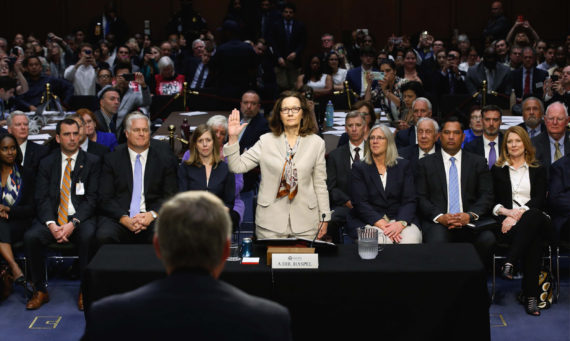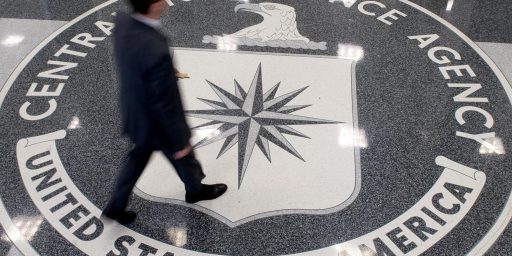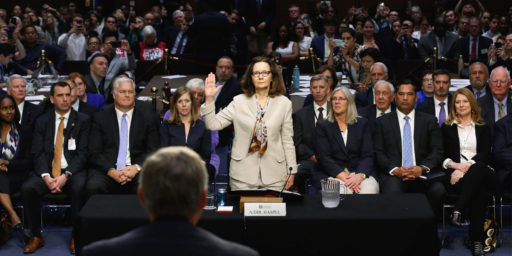Haspel Faces Questions About Torture, But Her Confirmation Seems Assured
Gina Haspel faced some tough questions from Democrats regarding her role in the C.I.A.'s post-9/11 torture programs, but she's likely to be confirmed anyway.

Gina Haspel, President Trump’s nominee to be the next Director of the Central Intelligence Agency, faced tough questions about her role in the post-9/11 torture practices that the agency engaged in during her confirmation hearing yesterday, but the latest headcount suggest she’s likely to be confirmed:
WASHINGTON — Gina Haspel, President Trump’s nominee to lead the Central Intelligence Agency, defended the agency’s torture of terrorism suspects as her confirmation hearing on Wednesday served as another reckoning of the extraordinary measures the government employed in the frantic hunt for the Sept. 11 conspirators.
Ms. Haspel, a 33-year C.I.A. veteran who oversaw a secret prison in Thailand in 2002 while a Qaeda suspect was waterboarded there, said that she and other spies were working within the law. Though the C.I.A. should never resume that type of work, she said, its officers should also not be judged for doing it.
“I’m not going to sit here, with the benefit of hindsight, and judge the very good people who made hard decisions, who were running the agency in very extraordinary circumstances,” she told the Senate Intelligence Committee.
But poised to take over the agency, Ms. Haspel vowed that she would not start another interrogation program like the one developed under President George W. Bush after 9/11 while the United States was actively trying to thwart terrorist plots. It involved brutal techniques like waterboarding detainees, dousing them with ice water, forcing them to stay awake for as long as a week and subjecting some to medically unnecessary rectal feeding.
“Having served in that tumultuous time,” she said, “I can offer you my personal commitment, clearly and without reservation, that under my leadership, C.I.A. will not restart such a detention and interrogation program.”
Ms. Haspel, 61, appeared headed for confirmation after two senators considered swing votes — Senator Joe Manchin III, Democrat of West Virginia, and Senator Susan Collins, a moderate Maine Republican — said later on Wednesday that they would support her.
At least one influential Republican, Senator John McCain of Arizona, was unconvinced by Ms. Haspel’s assurances and dealt a symbolic blow to her nomination.
In a statement on Wednesday night, Mr. McCain, a former prisoner of war and the chairman of the Armed Services Committee, said that “her refusal to acknowledge torture’s immorality is disqualifying,” and he urged his colleagues to vote against her. Mr. McCain is being treated for brain cancer and is not expected to make it back to Washington for the vote.
Seeking to shape the public’s impression of her in her first high-profile appearance, Ms. Haspel introduced herself at the hearing as an Army “brat” born in Kentucky and a “typical, middle-class American” — albeit one who spent her adult life on the rise in the exotic world of intelligence gathering, where danger and intrigue constantly lurked.
“From my first days in training, I had a knack for the nuts and bolts of my profession,” she said. “I excelled in finding and acquiring secret information that I obtained in brush passes, dead drops or in meetings in dusty alleys of third-world capitals.”
Ms. Haspel rejected Democrats’ suggestions that she declassify more information about her background, saying that the director should be subject to agency guidelines on keeping its secrets. She bristled and pushed back on charges that the interrogation program was immoral, insisting that her own “moral compass is strong,” and fought to describe what she said were the C.I.A.’s successes in capturing the United States’ most-wanted men.
The interrogation program “has cast a shadow over what has been a major contribution to protecting this country,” she said, citing the capture of Khalid Shaikh Mohammed, the self-described mastermind of the Sept. 11, 2001, attacks, as an example of the C.I.A.’s “extraordinary work.”
Her comments reflected how, years after the methods used by C.I.A. on Qaeda suspects were outlawed, a deep ambivalence remains inside the agency about the program.
The program was effectively ended in 2007 and its techniques prohibited by President Barack Obama in 2009. In a sweeping report in 2014, the Intelligence Committee excoriated the agency for practices that it said were far less effective than the C.I.A. led either the Bush administration or the public to believe.
Ms. Haspel defended herself, saying she embraced the chance to serve after the terrorist attacks.
“After 9/11, I didn’t look to go sit on the Swiss desk — I stepped up,” she said. “I was not on the sidelines. I was on the front lines in the Cold War, and I was on the front lines in the fight against Al Qaeda.”
Democratic senators peppered her with confrontational questions from the outset. They repeatedly asked for details on Ms. Haspel’s role in some of the most notorious episodes of the interrogation program, including her conveyance of an order from her superior to destroy videotapes documenting 92 of the interrogations.
In her first public account of the destruction, which occurred in 2005, she said there were concerns about the “security risk” the tapes posed — that the lives of undercover agency officers might be put in danger if they were to become public.
Rumors have long swirled — but have never been confirmed — that Ms. Haspel appeared in the tapes, some of which were made when she was running the C.I.A. detention facility in Thailand. Her answer was definitive: “I did not appear on the tapes,” she said.
Senator Mark Warner of Virginia, the top-ranking Democrat on the committee, questioned the timing of the agency’s order to destroy the tapes, which came days after an announcement of a Senate investigation into government detention programs. Ms. Haspel said she had not been aware of the investigation.
“I knew there was disagreement about the issue of the tapes outside the agency,” she said.
(…)
“The president has asserted that torture works,” Senator Kamala Harris, Democrat of California, said in one confrontational exchange. “Do you agree with that statement?”
Ms. Haspel replied that she did not believe it worked. But, she added, Qaeda operatives who were interrogated did give up useful information.
“Is that a yes?” Ms. Harris then asked.
“No, it’s not a yes,” Ms. Haspel said. “We got valuable information from debriefing of Al Qaeda detainees, and I don’t think it’s knowable whether interrogation techniques played a role in that.”
Still, Ms. Haspel insisted that even if the Trump administration were to produce a legal opinion justifying the use of torture, as officials in the Bush-era Justice Department had done, she would refuse.
“I would not put C.I.A. officers at risk by asking them to undertake risky, controversial activity again,” she said, adding: “I would not allow C.I.A. to undertake activity that I thought was immoral, even if it was technically legal. I would absolutely not permit it.”
It’s not surprising that Haspel’s role in the torture program would be the main focus of her confirmation hearing. As I’ve noted before, while Ms. Haspel has had a long and by all accounts distinguished career at the C.I.A., her role and activities during the period in the wake of the 9/11 attacks in the agencies operation of black sites at which prisoners were interrogated raises serious questions about her fitness for the office to which she has been named. When the President first put her name forward to replace Mike Pompeo at the top of the nation’s top intelligence agency, it was reported that Haspel oversaw the torture of at least one al Qaeda suspect while she was in charge of one these agency dark sites in Thailand. That report was later revised to make clear that she did not directly oversee any acts of torture. However, it has been largely unrefuted that she was apparently at least somewhat aware of what was going on and that she played a role in attempting to cover-up the agencies role in conducting torture of prisoners by pushing for the destruction of evidence that such torture had taken place. This last point is particularly relevant given the fact that President Trump has in the past said that we should go back to using the interrogation techniques that Haspel and others engaged in under C.I.A. auspices during the early years of the “War On Terror.” For all these reasons, Haspel’s answers to both her role in past agency action and the role she played in covering it up are entirely appropriate.
Not surprisingly, Haspel’s answers in the public session of yesterday’s hearing were, at best, frustratingly opaque. On some level, I suppose, this is understandable to the extent that her answers to the questions that several Senators were asking involved classified information that could not be discussed publicly. Based on the comments from Senators such as Maine’s Angus King, though, it seems as though Haspel was not any more forthcoming when the hearing went into a closed-door classified session in the afternoon, which appears to be the main reason that King announced that he would oppose her nomination. Also frustrating was the fact that Haspel refused to answer the question of whether or not she believed the torture techniques the agency had utilized in the past were wrong, regardless of whether or not the Executive Branch took the position that they were permitted by law. On the positive side, Haspel did seem clear regarding the question of whether or not she would authorize the use of torture methods such as waterboarding even if the President ordered it. In response to that position, she took the same position as previous Directors, including Mike Pompeo, in saying that the agency would not engage in those activities again in the future.
Even more frustrating about yesterday’s hearing is the fact that there seemed to be very little focus on the issues facing the nation and the intelligence community in the future and how Haspel might handle them were she confirmed. Near the top of the list among these issues include Russia’s continued assertiveness on the world stage, the fact that we know that Russia interfered in the 2016 U.S. elections and in elections in other western nations and that it will continue these efforts in the future. Also largely not discussed were other issues such as the rise of China and its own use of cyber warfare and espionage against the American government and American business interests, the Iran nuclear deal and the President’s decision to withdraw from that agreement, North Korea, and how she would handle her role as Director of the CIA under a President who once equated America’s intelligence agencies to Nazis. Instead of focusing on these issues, Republicans on the Intelligence Committee spent their time heaping the usual obsequious praise on the nominee while tossing her softballs, and Democrats largely confined their time to concentrate on an issue that is more than a decade in the past. While Haspel’s role in the agency’s actions in the wake of the 9/11 attacks is important, so are these other issues. It would have been nice if more of the questioning had focused on those other issues.
Despite the controversies, it appears at this point that Haspel will be confirmed in the end, albeit narrowly. As I’ve noted before, Kentucky Senator Rand Paul has indicated that he would oppose her nomination, and there’s no indication that he’ll change his mind on that issue. Additionally, Senator John McCain, who remains in Arizona recovering from treatment for cancer, had already expressed doubts about Haspel’s nomination and yesterday issued a statement urging the Senate to reject her nomination. McCain, however, is unlikely to be in Washington to vote against Haspel himself, and there are already signs that Republicans will end up with enough votes to get the nomination through with a simple majority. The first such indication came when West Virginia Senator Joe Manchin became the first Democrat to say he will vote for Haspel on the Senate floor. That announcement came just a day after West Virginia Republicans handed the nomination for Senate to state Attorney General Patrick Morrisey, who is widely seen as a potentially strong challenger for Manchin. Manchin could be followed by at least a few other vulnerable red-state Democrats, such as North Dakota’s Heidi Heitkamp and Indiana’s Joe Donnelly. In addition to Manchin, Maine Republican Susan Collins announced that she too will support Haspel on the floor, suggesting that Paul and McCain may be the only Republicans who will defect over to the “no” side on the nomination, although in McCain’s case the “no” will be purely symbolic since he will not be casting a vote. If that’s the case, then Haspel will have enough votes to be confirmed even if Manchin is the only Democrat to support her.






Gina the Torture Queen.
Well…except his rather extensive history of taking a principled stand and then caving when the rubber hit the road.
I really don’t think promoting a torture dominatrix to head the CIA sends the best message to the world.
Did anyone ask her why she suggested withdrawing her nomination?
@Kathy: If I recall the article I read over the weekend correctly, she was concerned that the reputation of the agency could be smeared by the questioning and its aftermath in the media and the halls of Congress.
Story of our lives, innit?
@Kathy: I believe her previous inclination to withdraw had something to do with the torturous confirmation process.
@Gustopher:
I see what you did there.
After thinking about it, a lot of veteran CIA officials would be ineligible for a higher posting if involvement with torture were a disqualifier. I also can make some allowances for the emotional climate at the time. Far more important is what any CIA director would do in the future.
And for that, these kinds of hearings are useless. No one will say they would go back to torturing suspects if the president, or Trump in this case, ordered it and justified it legally (though Trump wouldn’t care about that). I don’t believe that at all. Certainly not if there is another major attack like 9/11, or maybe in a war with Iran. Existential fear beats a moral compass every time.
@Just nutha…:
But Dennison already took care of such smearing.
Someone recently said, w/r/t to people supporting things just to ‘stick it to the libs’, and trump tearing down the Iran deal simply because it was obama’s, that the modern GOP was just a Politics of Vengeance, and torture fits into that too I suppose. It doesn’t matter that it’s immoral, it doesn’t matter that it doesn’t work. It makes Them suffer, so it’s good.
The modern Right is in a state of deep fuckupedness
Has anyone asked John Brennan, Obama’s CIA director, for his thoughts here? Or is this just more Because Trump opposition?
I don’t recall this level of hand wringing over him.